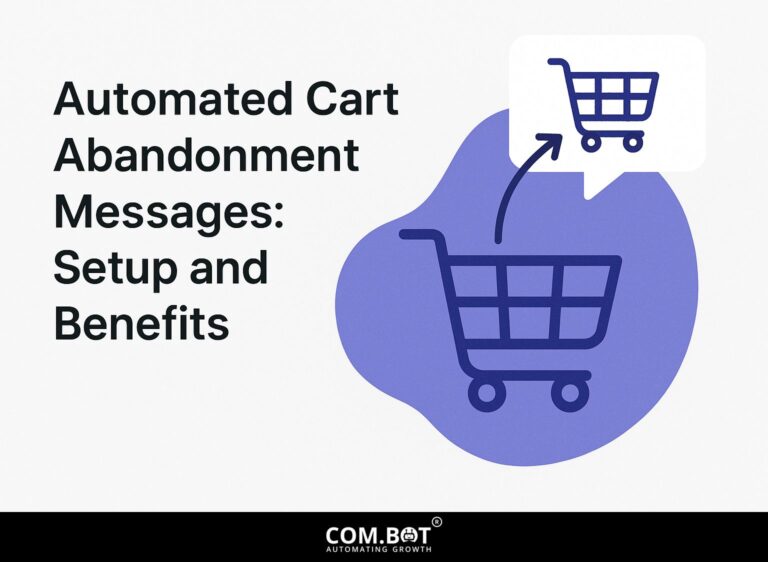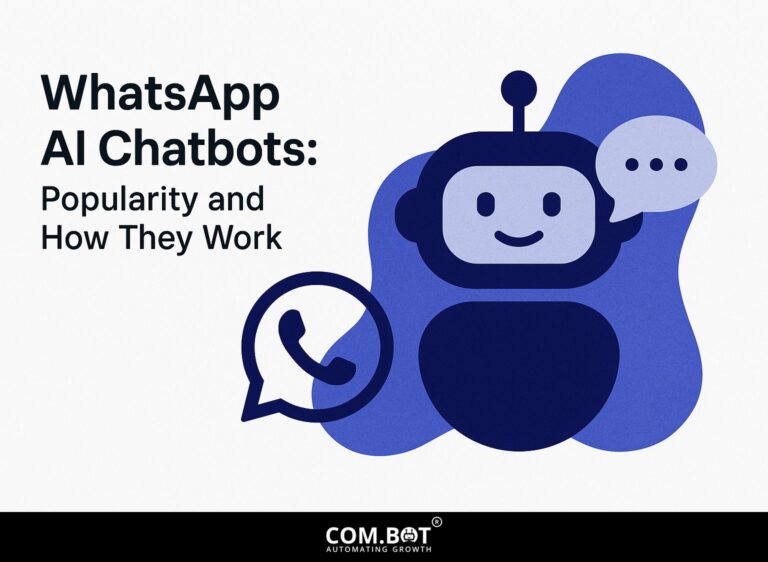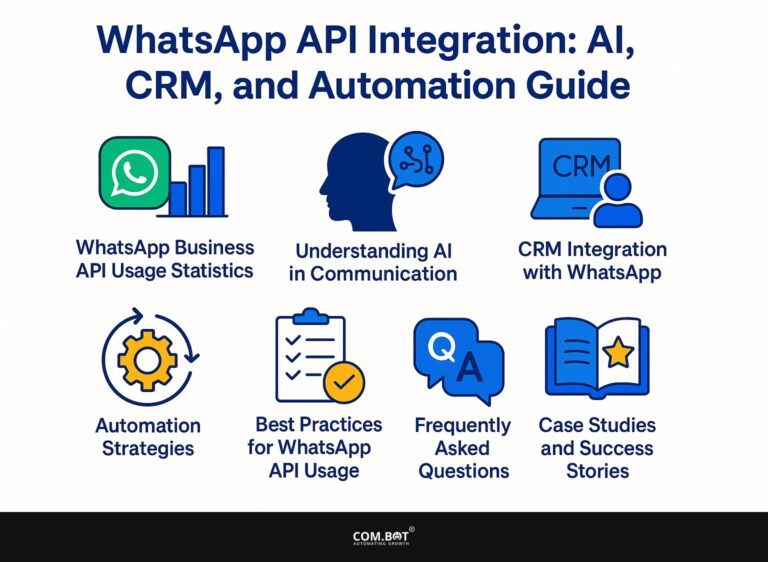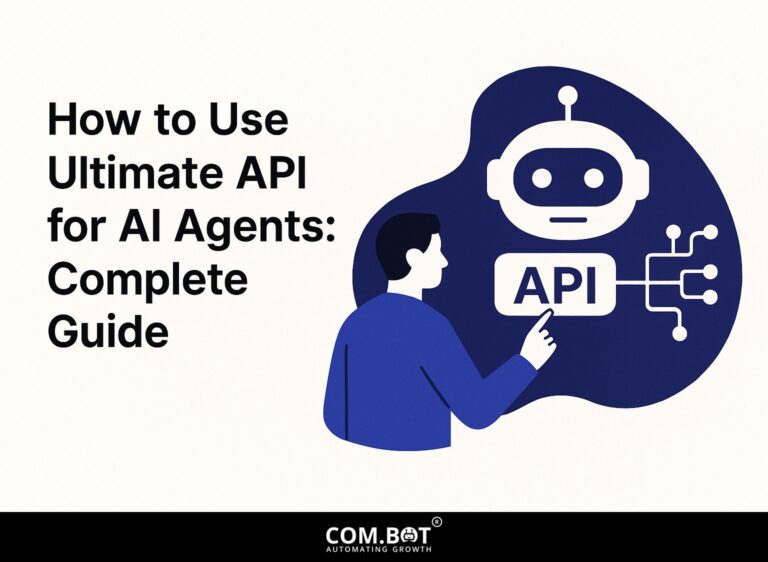AI Bots for Customer Support: Benefits and Satisfaction
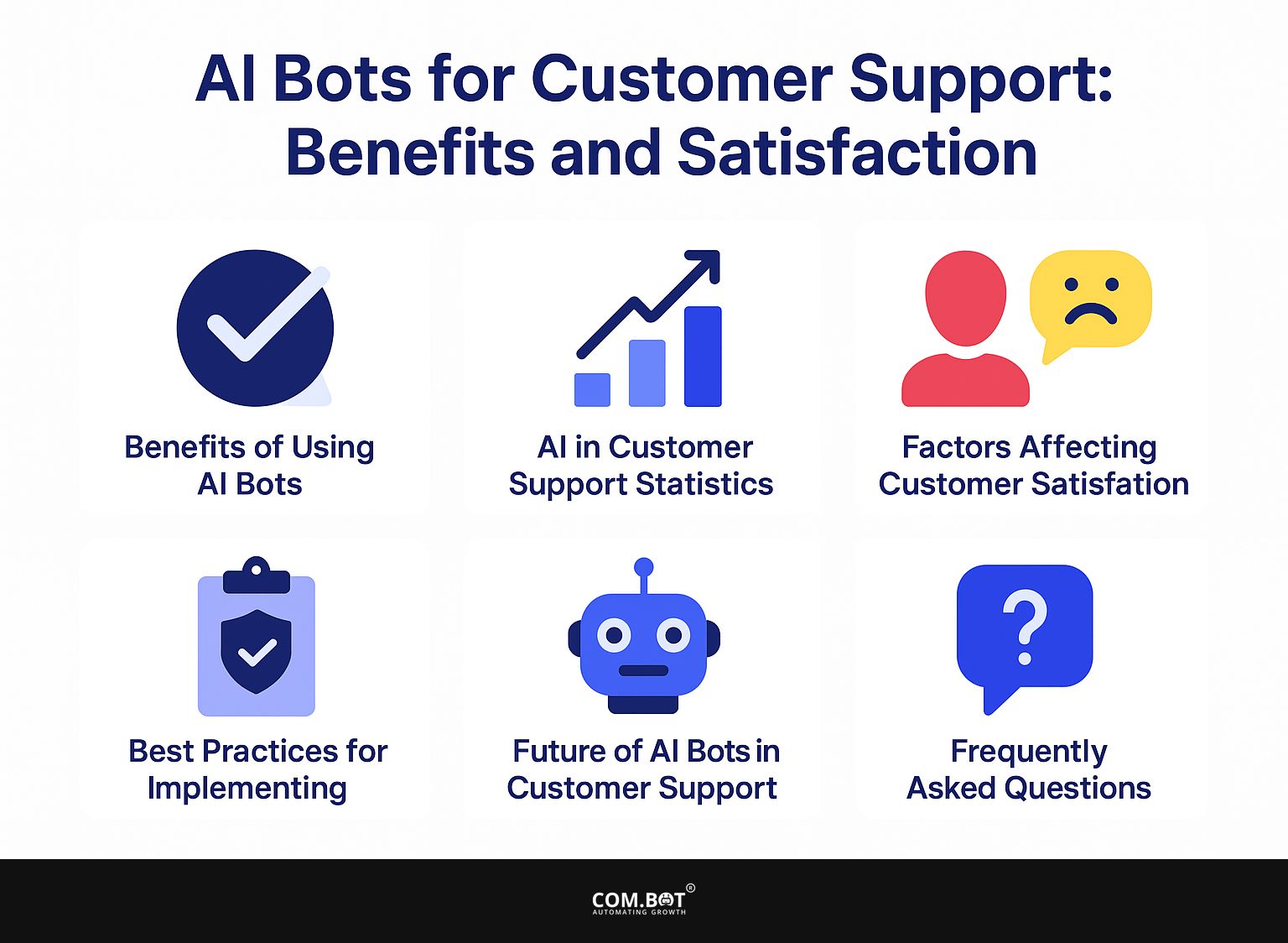
In the current rapid digital world, bots have emerged as powerful tools for enhancing customer support. These systems make operations more efficient and provide substantial benefits cost savings and improved customer experiences. The success of bots hinges on various factors, including their ease of use, accuracy, and ability to provide personalized interactions.
This article explores the benefits of bots, factors influencing customer satisfaction, best practices for implementation, and the promising future of technology in customer support. Join us to learn how these new ideas are changing the way companies interact with their clients.
Key Takeaways:
- AI bots for customer support provide better efficiency and save costs, which results in better business operations.
- The accuracy and personalization of AI bots can significantly impact customer satisfaction and overall experience.
- To successfully implement AI bots in customer support, it is essential to choose the right platform, provide adequate training, and maintain the bot regularly.
- 1 Benefits of Using AI Bots for Customer Support
- 2 AI in Customer Support Statistics
- 2.1 AI Adoption and Impact in Customer Support: Executive Expectations
- 2.2 AI Adoption and Impact in Customer Support: Customer Experience
- 2.3 AI Adoption and Impact in Customer Support: AI in Industries
- 2.4 AI Adoption and Impact in Customer Support: Operational Efficiency
- 2.5 1. Improved Efficiency and Cost Savings
- 2.6 2. Enhanced Customer Experience
- 3 Factors Affecting Customer Satisfaction with AI Bots
- 4 Best Practices for Implementing AI Bots in Customer Support
- 5 Future of AI Bots in Customer Support
- 6 Frequently Asked Questions
- 6.1 1. What exactly are AI bots for customer support and how can they benefit my business?
- 6.2 2. How do AI bots for customer support improve customer satisfaction?
- 6.3 3. Are AI bots for customer support able to handle complex inquiries?
- 6.4 4. Can AI customer support bots change to work with various languages and ways of communicating?
- 6.5 5. Do I need to have advanced technical skills to implement AI bots for customer support?
- 6.6 6. What are some potential challenges of using AI bots for customer support?
What are AI Bots and How Do They Work?
AI bots, also known as chatbots, are programs designed to imitate human conversation and provide automatic assistance for various customer inquiries. These bots use advanced technologies such as natural language processing (NLP) and machine learning to grasp what users ask, providing instant replies that improve how customers interact and feel satisfied.
By easily connecting with different systems, AI bots can handle tasks like booking reservations, solving problems, and giving technical help. They are important in today’s customer service approaches in various fields like retail and hospitality.
The interfaces are created to be easy to use, so customers can operate them without difficulty. At the same time, the backend programs keep improving by analyzing previous conversations to provide better responses later. This ability allows the AI bot to handle various customer requests and choices, improving the workflow.
These bots make the user experience better and gather customer information, helping businesses change their services more easily. AI bots help improve satisfaction and loyalty, making them important tools in the drive to reach high performance.
Benefits of Using AI Bots for Customer Support
AI bots in customer support bring many benefits that can greatly improve operations and make customers happier. AI chatbots are available all day and night, ready to respond to questions and handle tough issues anytime. This feature lowers costs and allows companies to give quick help, which is important for meeting growing customer expectations.
AI systems can also tailor interactions using each customer’s specific information, strengthening relationships and building loyalty over time. To enhance your understanding of AI’s role in customer support, learn more about Com.bot’s 24/7 AI Support Bot and its capabilities.
AI in Customer Support Statistics
AI in Customer Support Statistics
AI Adoption and Impact in Customer Support: Executive Expectations
AI Adoption and Impact in Customer Support: Customer Experience
AI Adoption and Impact in Customer Support: AI in Industries
AI Adoption and Impact in Customer Support: Operational Efficiency
The AI in Customer Support Statistics shows important information about how AI is changing how businesses communicate with customers, making experiences better, and improving operations in different fields. This dataset shows the excitement and hopes about AI’s part in customer support, as well as viewpoints from consumers and how often businesses are using it.
AI Adoption and Impact in Customer Support show that by 2025, 100% of customer interactions are expected to involve AI in some capacity. This demonstrates a complete integration of AI technologies in enhancing communication efficiency. Currently, 84% of executives already use AI for talking with clients, with 91% believing that AI enhances customer engagement. Moreover, 96% have faith in generative AI ‘s potential to improve customer support effectiveness and tailor services to individual needs.
- Customer Experience: 61% of clients prefer AI-produced responses, indicating a growing trust in AI for reliable and quick information delivery. Yet, only 50% of consumers have a positive outlook on AI in customer relations, signifying room for improvement in AI’s approachability and accuracy. In the context of eCommerce, 57% of buyers express confidence in AI’s capabilities, highlighting its role in streamlining shopping experiences.
- AI in Industries: Adoption varies, with 63% of retailers using AI to improve how businesses interact with customers and tailor their strategies to individual needs. In contrast, 46% of financial institutions use AI, maybe because of strict rules. Additionally, 70% of patients believe AI will change healthcare significantly, showing great possibilities for improvements in diagnosis and patient care through AI.
- Operational Efficiency: While 100% future expectation of AI in customer interactions remains, currently 75% of inquiries are resolved by AI It demonstrates its ability to process basic questions quickly. Moreover, 68% of processes are improved through AI, highlighting its part in making processes simpler, lowering expenses, and making services better.
The data shows that both business leaders and consumers strongly believe AI can improve customer support. While adoption and satisfaction levels vary across industries, the ongoing integration of AI in customer interactions promises significant improvements in efficiency and customer satisfaction as technology matures.
1. Improved Efficiency and Cost Savings
Implementing AI bots in customer service operations leads to significant improvements in efficiency and substantial cost savings for businesses. These systems manage basic questions, letting human agents concentrate on difficult matters that need personal involvement.
By integrating seamlessly into existing workflows, AI chatbots can provide real-time responses to user queries, enhancing the overall operational efficiency while reducing the need for extensive human support.
For instance, a recent study found that companies utilizing AI-driven customer service solutions can reduce operational costs by up to 30%. This is clear in industries like retail and telecommunications, where chatbots handle many interactions each day.
AI bots typically respond within seconds, while human agents may take a few minutes. This quick response time improves customer satisfaction. Data indicates that using AI bots can improve response accuracy by 70%, creating a more efficient way for businesses to communicate with their customers.
2. Enhanced Customer Experience
AI bots make customer service better by giving fast replies and personalized interactions based on each customer’s preferences. Using natural language processing, these chatbots can understand user questions and adjust their replies, leading to more engaging and satisfying conversations for customers.
Personalization meets and often surpasses customer expectations, resulting in increased satisfaction and loyalty. For instance, when a customer reaches out to support with a product issue, an AI bot can quickly look up past purchase records and recommend specific answers based on earlier conversations.
With machine learning, these bots regularly improve their algorithms to offer more accurate recommendations over time. This quick help changes the customer experience, turning possible problems into smooth solutions.
Businesses can gain from using these AI technologies because they work around the clock. This means customers can get quick help anytime, leading to a smoother and more satisfying experience.
Factors Affecting Customer Satisfaction with AI Bots
Customer satisfaction with AI bots relies on key elements like the accuracy of their answers and how personalized the interactions are. To understand these interactions more thoroughly, you might consider how rule-based bots compare to AI bots and their specific use cases.
When users engage with a chatbot, they expect exact information and quick handling of their questions, which greatly impacts their overall experience.
As customer expectations change, the ability of AI bots to adjust and provide specific solutions is increasingly important for maintaining high satisfaction levels.
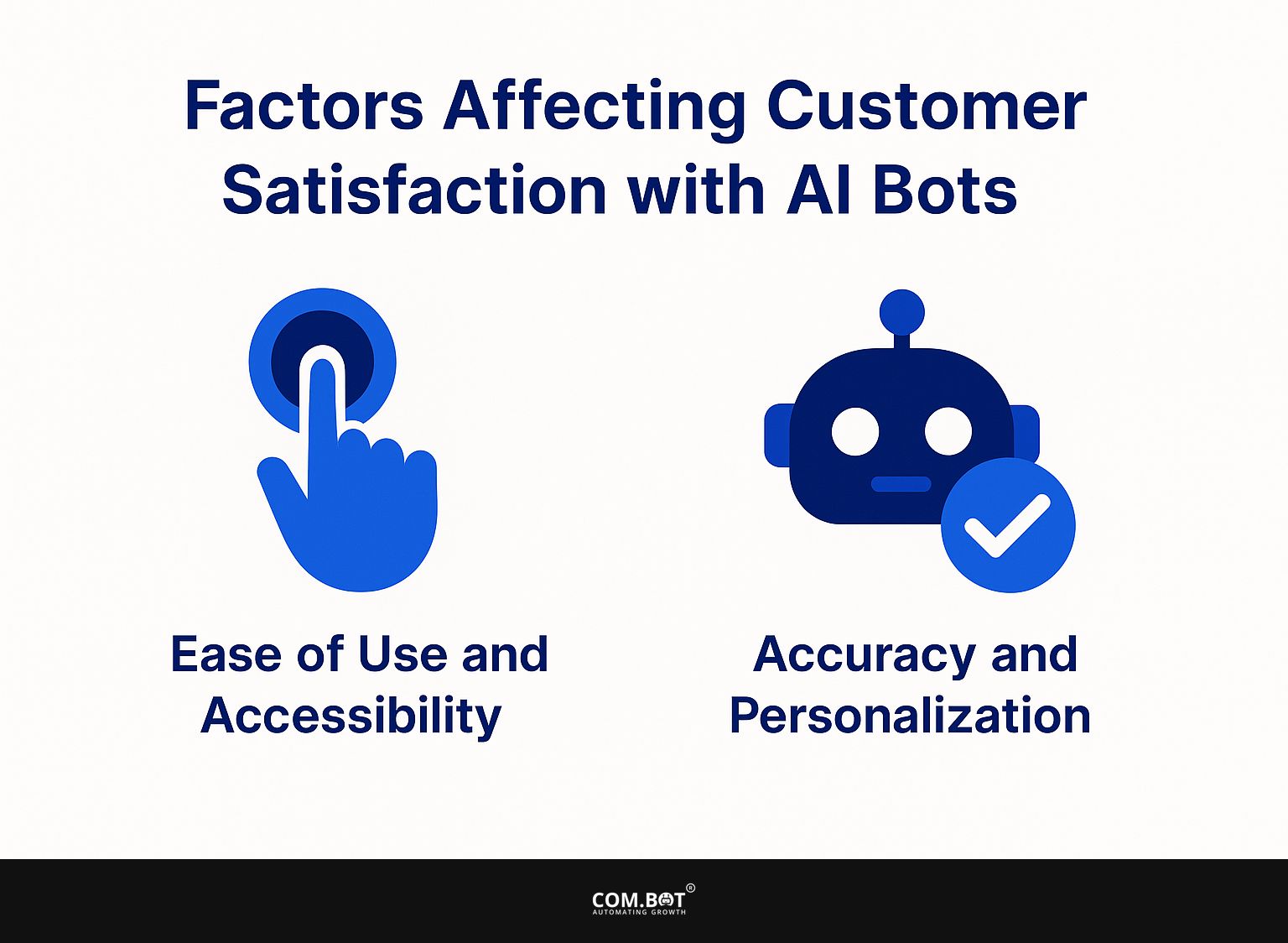
1. Ease of Use and Accessibility
AI bots are easy to use and access, which is important for keeping customers happy and engaged. The purpose of these bots is to make conversations run smoothly, allowing customers to easily manage their questions.
When customers encounter an intuitive interface, they are more likely to engage positively with the AI bot, enhancing their overall experience and satisfaction with customer service. Making menus simple to use and using clear language can significantly improve how customers interact with AI technology.
For instance, a well-designed AI bot might offer voice recognition features or simple button choices, ensuring that individuals of all abilities can access the information they need without frustration.
By focusing on accessibility features, like compatibility with screen readers and support for multiple languages, businesses can connect with more people and create an inclusive environment. These careful design decisions increase customer happiness and create trust and loyalty, resulting in lasting business success.
2. Accuracy and Personalization
The accuracy of AI bots and how well they meet each person’s needs play a big role in how happy customers are. An AI bot that gives clear answers to user questions can help customers trust and feel confident, while also acknowledging and meeting their specific needs.
The bot gives accurate answers and personalized interactions, which improve how it performs and greatly improve the customer experience. For example, a travel booking bot that recommends flights based on a user’s past trips shows knowledge of their specific likes and saves time.
When a customer asks about a product, getting correct and thorough information builds a strong connection between the customer and the brand. These personalized conversations build loyalty because customers value when their needs are understood and addressed quickly. Providing accurate and customized solutions creates a smooth experience that increases customer satisfaction.
Best Practices for Implementing AI Bots in Customer Support
To effectively use AI bots in customer support, companies should follow best practices to achieve top performance and keep customers happy.
First, choose the right platform and make sure it works smoothly with current customer relationship management systems. Also, keep training and updating the AI bot to improve its skills so it can meet changing customer needs and preferences.
This approach can be further enhanced by utilizing tools like Com.bot’s Conversational Analytics Dashboard to gather insights and optimize communication strategies.
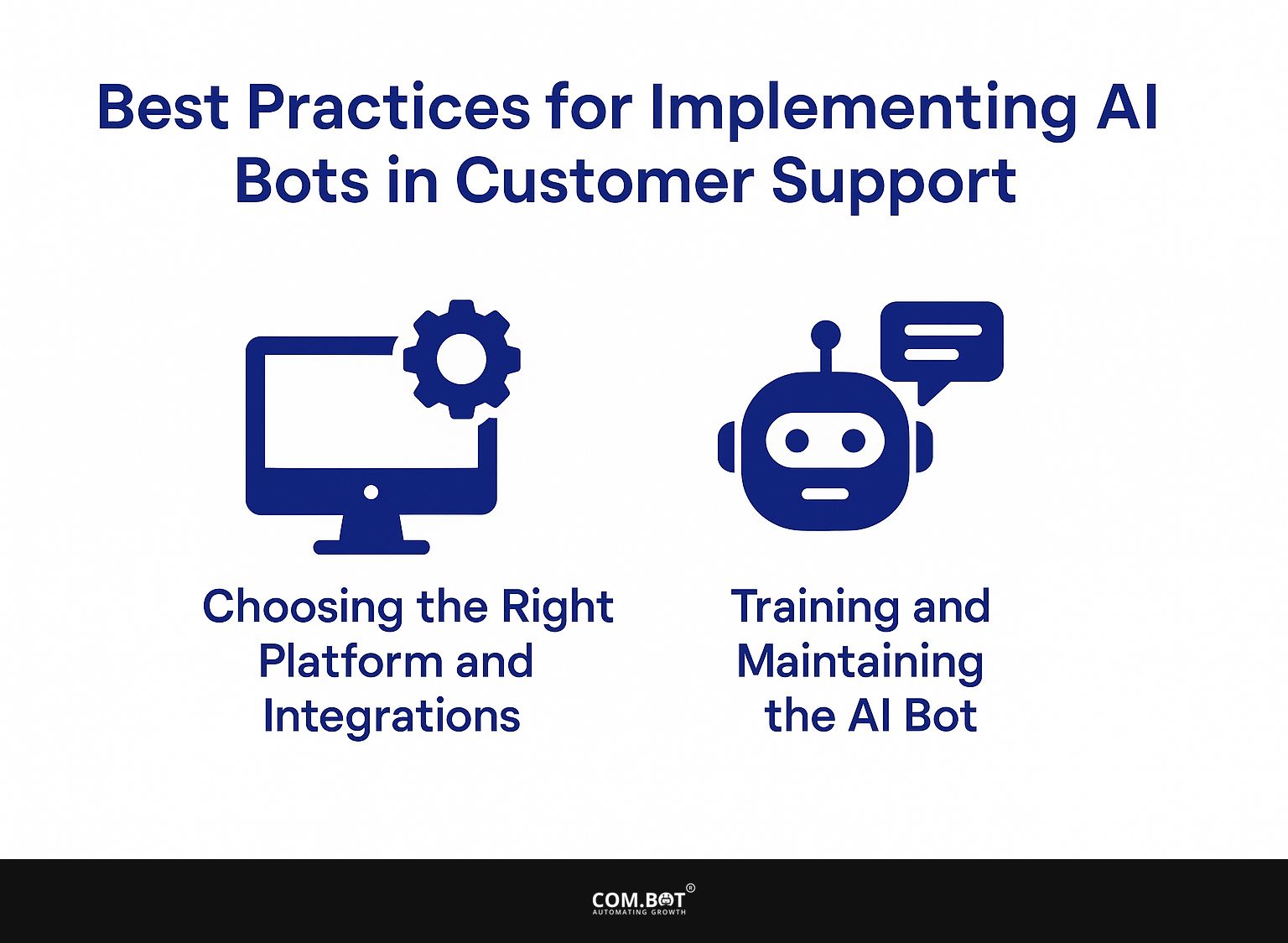
1. Choosing the Right Platform and Integrations
Choosing the right platform for AI bots is fundamental to enhancing customer support and operational efficiency. Businesses should find platforms that work well with their current systems, as this compatibility helps simplify processes and improve data collection.
Using an AI bot alongside business strategies can significantly improve how you get to know what customers do and decide. Businesses should check if the platform can expand easily to meet their changing requirements over time.
The ease of use of the interface is important because a simpler platform can lead to faster setup and learning, cutting down on delays and reducing staff frustration. The capacity to tailor features to fit particular business needs can improve the AI bots’ performance.
In the end, focusing on these criteria helps smoothly combine processes and improves how businesses work, allowing them to offer great experiences to customers.
2. Training and Maintaining the AI Bot
Teaching and keeping an AI bot in good working condition are important steps to keep it useful for helping customers and solving issues.
Regular updates based on user actions and feedback help the bot improve its knowledge of customer behavior and preferences, improving its performance over time. This ongoing commitment to maintenance directly correlates with improved customer satisfaction levels.
To accomplish this, organizations should create a clear timetable for training sessions that use various data sets showing present trends and user questions. Working together across data scientists, software engineers, and customer service teams helps make improvements.
Employing analytics tools to monitor the bot’s interactions can identify areas needing attention, enabling strategic adjustments to its algorithms. By creating a setting where constant learning is important, businesses can make sure their AI bots grow with customer needs, leading to better efficiency and customer loyalty.
Future of AI Bots in Customer Support
AI bots in customer support are expected to become more advanced and effective as technology improves. As AI gets better, we can expect bots to handle more difficult problems while working alongside human support instead of replacing it.
This mix will make customer service more effective and help businesses grow by meeting the changing needs of customers. Companies can leverage various platforms to enhance their AI strategy, such as implementing chatbots on social media.
Curious about how Instagram chatbots feature in this evolution? Our analysis explains the key factors.
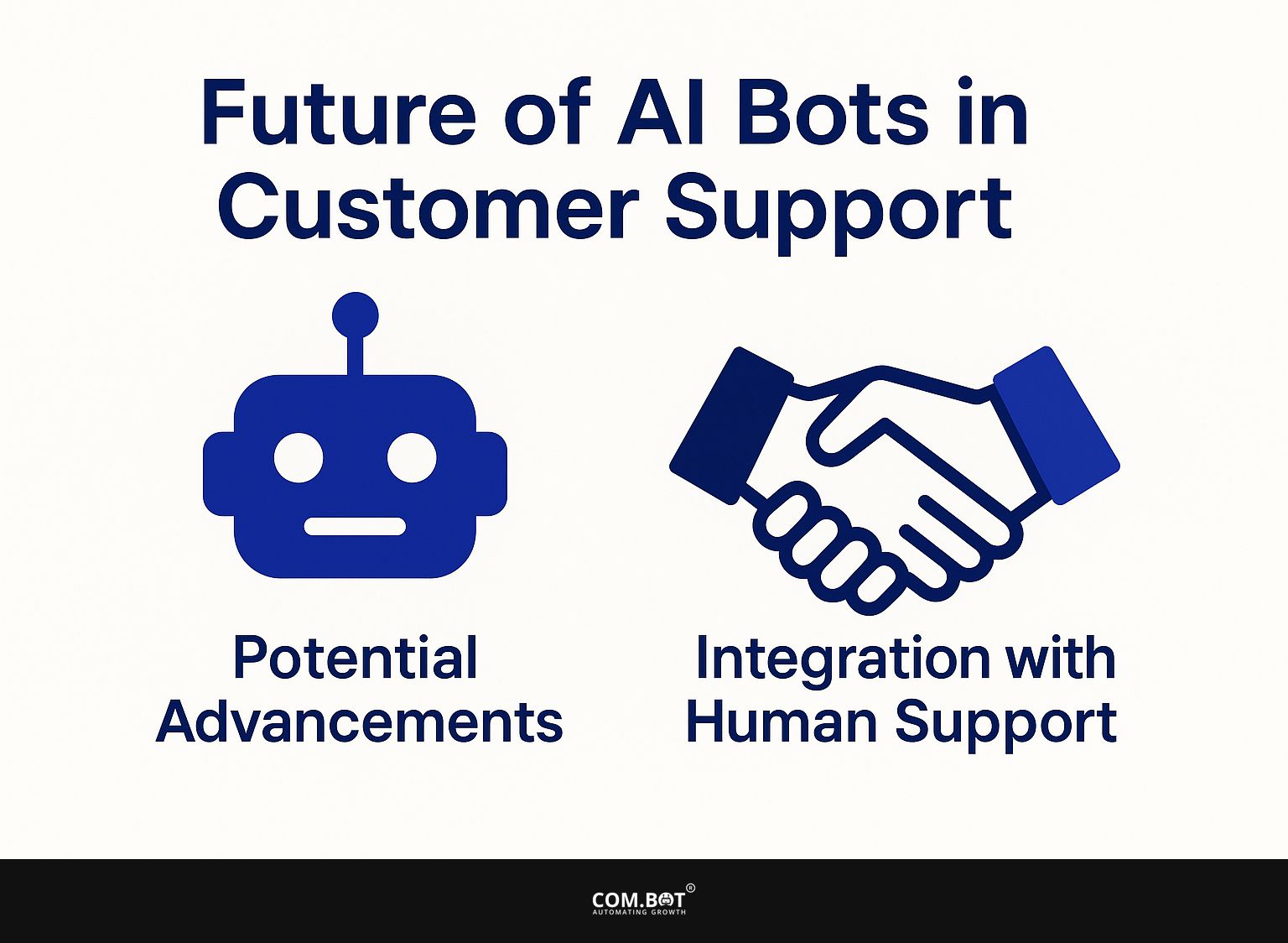
Potential Advancements and Integration with Human Support
Upcoming advancements in AI technology will significantly alter how AI bots operate in customer service, especially in collaboration with human support. As these systems become more sophisticated, they will be able to manage a wider range of inquiries and provide more detailed information, allowing human agents to focus on more complex interactions. The combination of AI bots and human support makes operations run better and greatly increases customer satisfaction.
The newest progress in language processing and machine learning will help these AI tools grasp context and reply with more empathy. This change makes customers feel recognized and valued, leading to experiences that better suit them.
As AI technology gets better, it will help create smooth transitions between machine systems and human help, making sure customers get help quickly. The integration will make it easier to manage tasks, helping businesses use their resources better while keeping services top quality.
Frequently Asked Questions
1. What exactly are AI bots for customer support and how can they benefit my business?
AI bots for customer support are computer programs created to talk to customers and give automatic help. They can handle a wide range of inquiries and tasks, freeing up human agents to focus on more complex issues. This can make things run more smoothly, cut expenses, and make the customer experience better.
2. How do AI bots for customer support improve customer satisfaction?
AI bots can provide immediate and consistent responses to customer inquiries, regardless of the time or day. This eliminates the frustration of waiting for a human agent to be available and reduces the likelihood of customer dissatisfaction. AI bots can manage many inquiries quickly and correctly, resulting in smoother and faster customer service.
3. Are AI bots for customer support able to handle complex inquiries?
Yes, AI bots are constantly learning and improving their abilities to handle complex inquiries. They use natural language processing and machine learning to understand and reply to many customer questions. If they can’t solve the problem, they will pass it to a human agent for more help.
4. Can AI customer support bots change to work with various languages and ways of communicating?
Yes, AI bots can be programmed to communicate in various languages and can change their communication styles. This helps them serve a wide range of customers and communicate clearly with everyone. They can learn and change to fit each customer’s needs and likes as time goes by.
5. Do I need to have advanced technical skills to implement AI bots for customer support?
No, many AI bot platforms offer user-friendly interfaces and do not require any coding or technical skills to implement. However, you need to clearly know your business needs and goals to choose the best AI bot solution for your business.
6. What are some potential challenges of using AI bots for customer support?
While AI bots can bring many benefits to customer support, there are also potential challenges to consider. These involve regular training and upkeep, making sure the AI makes fair decisions, and possible hesitation from customers about talking to a bot. It is important to carefully evaluate these factors and choose a reputable and trustworthy AI bot provider to mitigate these risks.
